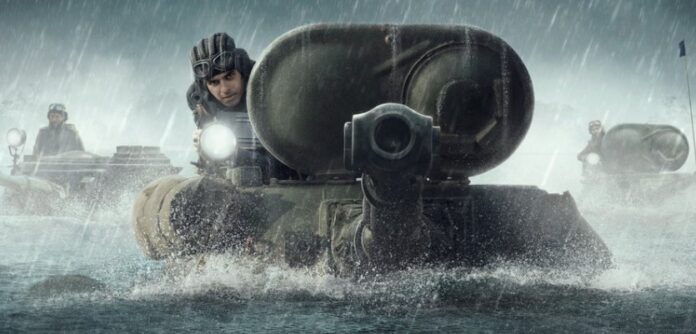In the heart of “Pippa, currently streaming on Amazon Prime ” Balram Singh Mehta, portrayed by Ishaan Khatter, emerges as the quintessential younger sibling—spoiled, brash, and insolent. As an Army brat, he grapples with the formidable legacy of his celebrated war-hero father and disciplinarian older brother, Ram (Priyanshu Painyuli).
Directed by Raja Krishna Menon, the film unfolds against the backdrop of the 1971 conflict, a pivotal moment in history that saw India’s military intervention shape the birth of a free Bangladesh.
Adapted from the real-life experiences detailed in Brigadier Balram Singh Mehta’s ‘The Burning Chaffees,’ “Pippa” engages viewers in a narrative that, while undeniably sincere, struggles to suspend disbelief. The film oscillates between moments of frenetic action, where soldiers navigate the perils of enemy fire, and an underlying awareness of the omnipresent camera-and-crew, subtly nudging us just beyond our field of vision.
Pippa Movie Review: Sibling Dynamics and War
“Pippa” serves as a dual exploration—delving into the complexities of sibling relationships and the profound impact of war. Ishaan Khatter embodies the headstrong Balram, whose journey arcs from rebellious youth to a self-discovering man. The film finds its stride in portraying the struggles of a young soldier forced to grow beyond the shadow of his familial military legacy.
Pros and Cons in Pippa
Compelling Coming-of-Age: Ishaan Khatter’s portrayal adds depth to Balram’s coming-of-age journey, capturing the essence of a young man learning to reconcile with his natural rebellious instincts.
Historical Significance: The film’s backdrop, set against the 1971 conflict, sheds light on India’s pivotal role in the creation of Bangladesh, adding a layer of historical significance.
Struggles with Believability: Despite sincerity, “Pippa” occasionally falters in maintaining a suspension of disbelief, especially during intense action sequences where the presence of the filmmaking apparatus becomes palpable.
A compelling war film immerses you in the visceral experiences of the battlefield, making you feel the intensity of every gunshot and yearn for the end of bloodshed alongside the characters on screen. However, in this instance, the capture and torture of Ram by a supposed menacing figure (Inaamulhaq) feels more like a caricature than a genuine portrayal, despite the undeniable screen presence of Painyuli, an actor worth seeing more of. Mrunal Thakur’s portrayal of a sister engaged in code-cracking for a top-secret organization comes across as generic, and the talents of Soni Razdan appear underutilized and overlooked.
Conclusion:
“Pippa” offers a multifaceted narrative, blending war, sibling dynamics, and self-discovery. Ishaan Khatter’s portrayal of Balram is a highlight, capturing the nuances of a young man grappling with his identity amidst the chaos of war. While the film struggles with moments of incredulity, it manages to weave an engaging tapestry of human resilience, familial bonds, and the impact of historical events. “Pippa” invites audiences to reflect on the dual battles—on the field of war and within the depths of personal growth.

